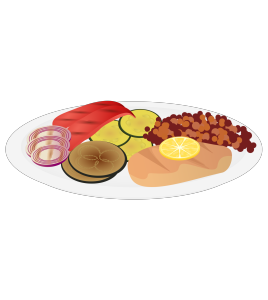The Skinny on Protein
 High-protein, low-carbohydrate diets are back in the spotlight, thanks to the Paleo, South Beach and Atkins trends. While protein is a necessary nutrient for the body in order to build lean muscle, synthesize hormones, grow hair and nails, and maintain organs, information about how much protein we really need and in what form seems to be misleading and/or lacking. Here’s the skinny…Protein needs change throughout your lifecycle, but, for the most part, we can determine needs using a simple guideline take in 0.8 grams of protein per kilogram of body weight. For a 150-pound person, that works out to approximately 55 grams of protein per day. Our protein needs can be met easily with a glass of milk with breakfast (12g), a turkey sandwich on whole wheat bread at lunch (27g), and a grilled chicken breast with dinner in the evening (21g). Adding in fruits, vegetables, whole grains, and low-fat dairy provides a well-rounded diet that encompasses essential nutrients from all foods, including additional protein.Protein doesn’t need to come solely from animal products. In fact, nuts, seeds, whole grains, beans, and legumes have enough essential amino acids (the building blocks of protein) to provide the necessary tools to maintain a healthy body. New research shows that vegetarians and vegans no longer need to eat plant-based protein sources in combination in order to ingest complete proteins. Rather, eating enough variety in protein choices throughout the day will allow the body to have an adequate amount of complete proteins. Here are some examples of how quickly your protein needs can add up from plant sources:
High-protein, low-carbohydrate diets are back in the spotlight, thanks to the Paleo, South Beach and Atkins trends. While protein is a necessary nutrient for the body in order to build lean muscle, synthesize hormones, grow hair and nails, and maintain organs, information about how much protein we really need and in what form seems to be misleading and/or lacking. Here’s the skinny…Protein needs change throughout your lifecycle, but, for the most part, we can determine needs using a simple guideline take in 0.8 grams of protein per kilogram of body weight. For a 150-pound person, that works out to approximately 55 grams of protein per day. Our protein needs can be met easily with a glass of milk with breakfast (12g), a turkey sandwich on whole wheat bread at lunch (27g), and a grilled chicken breast with dinner in the evening (21g). Adding in fruits, vegetables, whole grains, and low-fat dairy provides a well-rounded diet that encompasses essential nutrients from all foods, including additional protein.Protein doesn’t need to come solely from animal products. In fact, nuts, seeds, whole grains, beans, and legumes have enough essential amino acids (the building blocks of protein) to provide the necessary tools to maintain a healthy body. New research shows that vegetarians and vegans no longer need to eat plant-based protein sources in combination in order to ingest complete proteins. Rather, eating enough variety in protein choices throughout the day will allow the body to have an adequate amount of complete proteins. Here are some examples of how quickly your protein needs can add up from plant sources:
- Soy – 10 grams per ½ cup
- Peanut butter – 8 grams per 2 tablespoons
- Rice and beans – 7 grams per cup
- Seitan – 21 grams per 1/3 cup
- Quinoa – 8 grams per cup (cooked)
- Lentils – 18 grams per cup (cooked)
- Almonds – 6 grams per ounce
Excess protein in the diet can have side effects, especially when paired with low-carbohydrate intake. Toxic ketones can be formed in the presence of high-protein, low-carbohydrate diets, taxing the kidneys and leading to dehydration, fatigue, and bad breath. Excess protein (and excess fat from the animal protein sources) can also put a strain on the heart, and lead to vitamin and mineral deficiencies when fruits and vegetables are under-consumed. When weight loss or improved athletic performance is your goal, don’t turn to excess protein. Variety, balance, and moderation are the keys to a successful journey toward optimal health.By Beth Rosen, MS, RD


